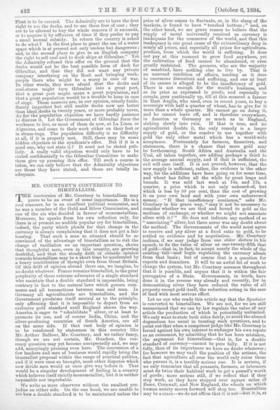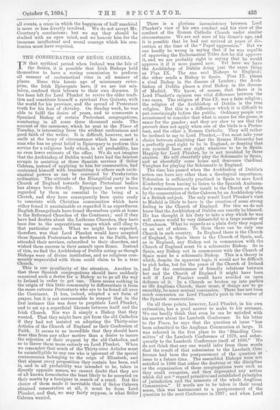MR. COURTNEY'S CONVERSION TO BIMETALLISM.
THE conversion of Mr. Courtney to bimetallism may 1 prove to be an event of some importance. He is a cool reasoner, he is an excellent political economist, and he was a member of the Gold and Silver Commission, and one of the six who decided in favour of monometallism. Moreover, he speaks from his own reflection only, for there is at present no audible popular cry for bimetallism, indeed, the party which pleads for that .change in the currency is always complaining that it does not get a fair hearing. That such a man so situated should be so convinced of the advantage of bimetallism as to risk the charge of vacillation on an important question, shows that thoughtful men, even is this country, are growing doubtful, and that the steady drift of outside opinion towards bimetallism may in a short time be accelerated by a heavy contribution of thought even from Great Britain. Of this drift of opinion abroad there can, we imagine, be no doubt whatever. France remains bimetallist, to the great perplexity of those extreme advocates of a single standard who maintain that a double standard is impossible, being contrary in fact to the natural laws which govern com- merce and all transactions between man and man. In Germany all agriculturists are bimetallists, and the Government proclaims itself neutral as to the principle, only affirming that it is impossible to depart from an exclusive gold standard until England shows the way. America is eager to " rehabilitate " silver, or at least to promote its use, and of course India, China, and the silver-producing countries of South America, are all on the same side. If that vast body of opinion is to be reinforced by statesmen in this country like Mr. Arthur Balfour, Mr. Courtney, and we rather fancy, though we are not certain, Mr. Goschen, the cur- rency question may yet become unexpectedly and, we may add, annoyingly pressing even here. The conversion of a, few bankers and men of business would rapidly bring the bimetallist proposal within the range of practical politics, and if it were once so brought, most other disputes which now divide men would at once give way before it. That would be a singular development of feeling in a country which believes itself strictly monometallist; but it is neither impossible nor improbable.
We write as mere observers without the smallest pre- judice on either side. On the one hand, we are unable to see how a double standard is to be maintained unless the price of silver ceases to fluctuate, or, in the slang of the markets, is found to have " touched bottom ; " and, on the other hand, we see grave reason to believe that the supply of metal universally received as currency is inadequate for the commerce of the world, and that this inadequacy is one great cause of the extraordinary drop in nearly all prices, and especially all prices for agricultura.. produce, from which the world is suffering. It does not pay at this moment to grow food anywhere, yet the cultivation of food cannot be abandoned, or even greatly restricted. The growers, who are the majority of mankind, have nothing else to live by. That is an unsound condition of affairs, tending as it does to enormous discontent and suffering, and one at least of its causes is alleged to be the insufficiency of gold. There is not enough for the world's business, and so its price as expressed in goods, and especially in cereals, goes continually up, till at this moment a farmer in East Anglia, who used, even in recent years, to buy a sovereign with half a quarter of wheat, has to give for it more than a whole quarter. He cannot go on doing it, and he cannot leave off, and is therefore everywhere, in America or Germany as much as in England, sinking slowly into ruin. If that is true, and no agriculturist doubts it, the only remedy is a larger supply of gold, or the resolve to use together with gold the only other metal which has a world-wide acceptance. Fortunately for farmers, financiers, and statesmen, there is a chance that more gold may be forthcoming. South Africa and Australia and the Ural, all taken together, are adding perhaps a third to the average annual supply, and if that is sufficient, the evil will cure itself. It is not proved, however, that the new supply is sufficient, rather, the evidence is the other way, for the additions have been going on for some time, and wheat has fallen all the while by great leaps and bounds. It was sold last week at 16s. and 17s. a quarter, a price which is not only unheard-of, but which is less by 50 per cent. than the cost of growing it on your own land and with your own unborrowed money. "If that insufficiency continues," asks Mr. Courtney in his grave way, " may it not be necessary to consider whether we are tied and bound to gold as the medium of exchange, or whether we might not associate silver with it ? " He does not indicate any method of so " associating" silver, but there never was any doubt about the method. The Governments of the world must agree to receive and pay silver at a fixed ratio to gold, to be settled on evidence and by negotiation. Mr. Courtney inclines, if we may judge from one obiter dictum in his speech, to fix the value of silver as one-twenty-fifth that of gold—that is, in fact, to accept nearly the whole of the existing fall—and begin regulating the currency afresh from that basis ; but of course that is a question for experts and financiers. It will be an awful bit of work to change the system, but Mr. Courtney assumes throughout that it is possible, and argues that it is within the fair prerogative of a State. Governments, in truth, have done it in the reverse way already and recently, for in demonetising silver they have reduced the value of all property except gold itself, the reduction acting in the case of land with most serious effect.
Let no one who reads this article say that the Spectator is converted to bimetallism. We are not, for we are still unconvinced that we can by law regulate the value of any article the production of which is potentially unlimited. We only want to state both sides fairly, to avoid the absurd dogmatism too usual in treating such questions, and to point out that when a competent judge like Mr. Courtney is forced against his own interest to endanger his own repute as an economist, by admitting that he has been mistaken, the argument for bimetallism—that is, for a double standard of currency—cannot be pure folly. If it is not folly, then of its importance we have no doubt whatever ; for however we may exalt the position of the artisan, the fact that agriculture all over the world only ruins those who pursue it, is a terribly serious one. It is serious, if we only remember that all peasants, farmers, or labourers must do twice their habitual work to get a pound's worth of goods ; more serious still, if we reflect that if they stop work, as they have stopped over square miles of Essex, Cornwall, and New England, the wheels on which human society moves forward will stop too. Bimetallism may be a craze—we do not affirm that it is not—but it is, at all events, a craze in which the happiness of half mankind is more or less directly involved. We do not accept Mr. Courtney's conclusions ; but we say they should be studied with an open mind, and we honour him for the immense intellectual and moral courage which his con- fession must have required.







































 Previous page
Previous page